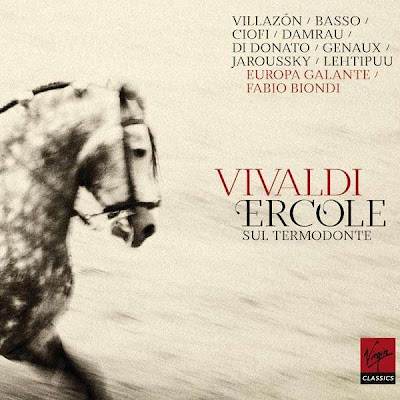Antonio Vivaldi
Ercole sul'Termodonte
Dramma musicale in 3 atti
Ercole: Rolando Villazon
Orizia: Patrizia Ciofi
Martesia: Diana Damrau
Ippolita: Joyce DiDonato
Antiope: Vivica Genaux
Telemone: Topi Lehtipuu
Alceste: Philippe Jaroussky
Teseo: Romina Basso
Europa Galante
Fabio Biondi
Virgin Classics 2 x CD
Release Date: 29th November 2010
Running time: 144'
Hercules reborn! Rolando Villazón and Joyce DiDonato lead a dazzling cast in Vivaldi’s opera Ercole sul’Termodonte, first heard in Rome in 1723 and reconstructed by conductor Fabio Biondi from the original libretto, historical scores and his intimate knowledge of the composer.
Like the mythical Hercules, hero of this opera by Vivaldi, dynamic tenor Rolando Villazón has triumphed over some huge challenges, including an operation in 2009 on his vocal chords. In this, his first complete studio recording of an opera for Virgin Classics, he takes on the title role of Hercules, whose mission is to obtain the belt of the Amazon queen Hippolyta. She is portrayed by Joyce DiDonato, whose Virgin Classics album of Handel, Furore, gave ample evidence of both her seductive powers and her intrepid spirit in Baroque music. Completing the cast is a dazzling line-up of virtuoso star singers: Diana Damrau, Vivica Genaux, Philippe Jaroussky, Patrizia Ciofi, Romina Basso and Topi Lehtipuu.
The conductor is Italian Baroque specialist Fabio Biondi, directing his group Europa Galante. His Virgin Classics recording of Vivaldi’s opera Bajazet, nominated for a Grammy, won multiple awards including the Grand Prix de l'Académie du Disque Lyrique in France, an ECHO Award in Germany and a Midem Classical Award. It also received the highest praise from publications such as Le Monde de la Musique, Diapason, Classica-Répertoire, Opéra International, Pizzicato, Opera News and Gramophone, which said: “Fabio Biondi and his players bring out countless nuances in the score with their usual array of interpretative devices ranging from gentle cello chords in recitative to sparky off-beat accents and pizzicati, and even some acid sul'ponticello. There could hardly be a better way to bring this opera to life.”
Biondi himself brought the score back to life, reconstructing it for performance in Venice in 2007, and subsequently in Paris in 2009. No autograph score or contemporary copy of the opera was in existence, but Biondi worked from the libretto printed for the first performances in Rome in 1723. He was then able to identify various arias from other Vivaldi scores kept in libraries around Europe, principally in France and Germany. In many cases, he also orchestrated the arias, extrapolating from their musical substance and his intimate knowledge of Vivaldi’s practice. Where no source existed for an aria or chorus, he reconstructed the music by adapting and borrowing from other works by Vivaldi. He also composed all the recitatives.
As Biondi explains: “This opera occupies a special and emblematic position in Vivaldi’s life. At the age of 45, he took the risk of presenting an opera in Rome for the first time … Ercole proved a resounding success … The city was full of talk about this opera which, by introducing a new musical style, seemed to revolutionise a genre much loved in the Eternal City. His melodic invention, his bel canto lyricism, rhythmic impulse and colourful instrumentation captured the imagination of music lovers.”
Download links


No comments:
Post a Comment